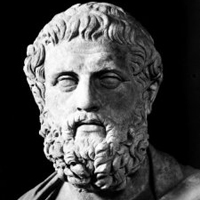Summary of Sophocles' Antigone
Antigone's two brothers, Polynices and Eteocles, had fought a battle for the sake of the kingship of Thebes. As the play begins, they are both dead, having killed each other in the war. Creon, the brother of Jokaste, is the new monarch who has given a decree to honor the death of the younger brother, Eteocles by giving him a state funeral as he fought for the nation but he refuses to bury Polynices for his betrayal to the state.

Sophocles
He further declares that anyone who dares to bury him would be stoned to death.
Antigone is not happy with the unjust decision of Creon for she believes that a proper burial is the right of all citizens and it is the will of god too. The law of God is greater than the law of man. So she is determined to give proper burial right to his other brother Polynices. Her sister Ismene fears to support her stating that they may get the death penalty. Strong willed and determined Antigone finally buries her brother as per the religion. The news of Polynices' burial reaches to the king Creon.
Creon is too rigid on his commandments and strong headed enough to implement them. When he hears the disobedience, he is furious with rage. He summons to search and bring the culprit in front of him. When Antigone, his would be daughter in law, fiancée of Haemon, is brought in front of him, he is frantic with anger and questions upon her actions. Without any fear and hesitation, she continues to argue with Creon on the morality of her deed in burying her brother and further asks about the moral ground of his decree for not giving burial to Polynices when it is gods' law to be buried all the dead people. At the same time, Ismene is called upon despite her innocence and makes her confess the guilt. But, Antigone goes on defending Ismene and confessing solely for the deed.
Creon's only son, Haemon, who is engaged to Antigone, asks his father to reconsider on this issue. But they cannot come to the point where they can settle the issue. So, Haemon leaves the palace vowing never to see him again. Creon eventually decides to saveIsmene but commands that Antigone should be buried alive in a cave as punishment for her disobediences. She is brought out of the house and is taken to bury alive in the cave.
The blind prophet of Thebes Tiresias comes and advises Creon that the gods are with the deed of Antigone and further warns him that he will lose a child for his crimes of leaving Polynices unburied and for punishing Antigone so severely. Moreover, Tiresias warns that all of Greece will scorn him, and that the sacrificial offerings of Thebes will not be accepted by the gods, but Creon simply dismisses him as a corrupt old fool.
After hearing the warning of the blind seer, the horrified Chorus plead Creon to reevaluate his decision, and eventually he accords to follow their advice and to free Antigone and to bury Polynices. Creon, traumatized by the prophet's warnings is repentant and looks to correct his previous wrong doings.
Suddenly, a messenger reports that, in their desperation both Haemon and Antigone have killed themselves. Creon's wife, Eurydice, is worried with grief over the loss of her son, and she also commits suicide, with her last breath she has cursed her husband Creon. Creon now blames himself for all the consequences he has faced now and staggers away from the stage. He has not paid any homage to the god's will and lost his child and wife. The chorus ends the play by stating that gods punish the proud and this punishment brings wisdom too.
Antigone Study Center
Dramatic Irony in Sophocles' Antigone
Human Law and Law of God in Antigone
 |
bachelorandmaster.com |